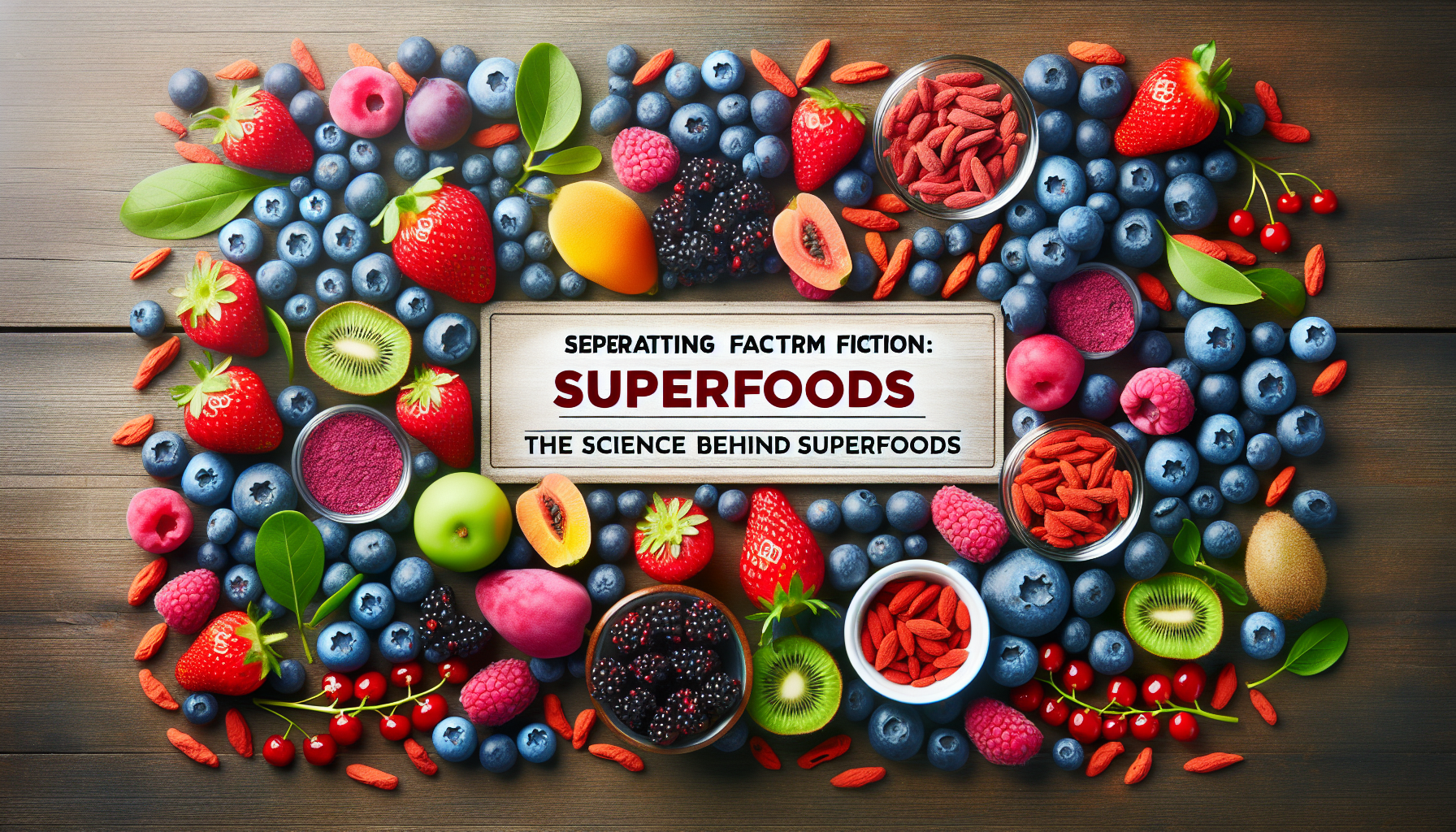In this article, you will discover the fascinating world of superfoods and uncover the science behind their extraordinary claims. From ancient grains to exotic berries, there seems to be a constant stream of new “superfoods” entering the market. But how much truth is there behind their health benefits? By diving into the scientific research, we will separate fact from fiction and shed light on whether these superfoods truly live up to their hype. Prepare to be amazed as we uncover the secrets behind these nutritional powerhouses.
The Basics of Superfoods
What are superfoods?
Superfoods are nutrient-dense foods that are believed to have a multitude of health benefits. They are typically rich in essential vitamins, minerals, antioxidants, and other beneficial compounds. What sets superfoods apart from regular food is their high concentration of nutrients, which can contribute to overall well-being and disease prevention.
Common examples of superfoods
There is a wide variety of superfoods, each offering unique nutritional benefits. Some common examples of superfoods include berries (such as blueberries, strawberries, and goji berries), leafy greens (like kale and spinach), fatty fish (such as salmon and mackerel), nuts and seeds (like almonds and chia seeds), and whole grains (such as quinoa and oats). Other superfoods include turmeric, ginger, green tea, and dark chocolate. These are just a few examples, as the list of superfoods is extensive and constantly expanding.
The Nutritional Value of Superfoods
Superfoods and their high nutrient content
Superfoods are packed with essential nutrients that are vital for the body’s optimal functioning. They are often rich in vitamins, minerals, and fiber, which are crucial for maintaining good health. For example, berries are known for their high vitamin C content, which supports the immune system and promotes collagen production for healthy skin. Leafy greens, on the other hand, are abundant in vitamins A, C, and K, as well as iron and calcium, making them beneficial for bone health and immune support.
The role of antioxidants in superfoods
One important aspect of superfoods is their high antioxidant content. Antioxidants are powerful compounds that help protect the body from free radicals, which can cause oxidative stress and contribute to various diseases. Superfoods like berries, dark chocolate, and green tea are particularly rich in antioxidants, which can help reduce the risk of chronic diseases such as heart disease, cancer, and neurodegenerative disorders. Antioxidants also play a role in promoting overall skin health and a youthful appearance.
Superfoods and Disease Prevention
Superfoods and their potential health benefits
Superfoods have gained popularity due to their potential health benefits. Many superfoods are associated with reducing the risk of chronic conditions, including heart disease, diabetes, and certain types of cancer. For instance, fatty fish, like salmon, contains omega-3 fatty acids, which have been shown to reduce inflammation and lower the risk of heart disease. Additionally, cruciferous vegetables like broccoli and cauliflower are high in fiber and antioxidants, which have been linked to a decreased risk of certain cancers.
Scientific studies on superfoods and disease prevention
Scientific studies have delved into the potential benefits of superfoods for disease prevention. Research has shown that consuming a diet rich in superfoods can have a positive impact on health outcomes. For example, a study published in the Journal of Nutrition found that a diet high in berries was associated with a lower risk of developing cardiovascular disease. Another study published in the American Journal of Clinical Nutrition showed that a diet rich in whole grains was linked to a reduced risk of type 2 diabetes.
Exploring the Superfood Hype
The marketing of superfoods
Superfoods have become a popular topic in the health and wellness industry, and their marketing often touts them as a magical solution for various health concerns. Merchants often label foods as superfoods to attract consumers looking for quick health fixes. However, it is crucial to approach the hype surrounding superfoods with a critical eye and rely on scientific evidence to separate fact from fiction.
Claims versus scientific evidence
While many superfoods do offer significant health benefits, it is important to differentiate between marketing claims and scientifically proven facts. Some claims made about superfoods may be exaggerated or unsupported by evidence. It is advisable to consult trusted sources and scientific studies to evaluate the true nutritional value and potential benefits of different superfoods. Keep in mind that eating a balanced diet with a variety of nutrient-rich foods is always the best approach for overall health.
Superfoods for Weight Loss
Understanding the role of superfoods in weight loss
Superfoods are often promoted as aids for weight loss due to their high nutrient content and potential to increase satiety. Incorporating superfoods into your diet can help you feel fuller for longer, reducing the urge to overeat. They are typically low in calories while being rich in essential nutrients, making them a beneficial addition to any weight loss plan.
The effectiveness of superfoods for weight management
While superfoods can be a smart choice for weight loss, it is important to note that they are not a magical solution on their own. Weight management is a complex process that involves various factors, including overall calorie intake, physical activity, and lifestyle habits. Superfoods can certainly contribute to a healthy weight loss journey, but they should be part of a holistic approach that includes a balanced diet and regular exercise.
The Truth about Superfood Supplements
Different types of superfood supplements
Superfood supplements come in various forms, including powders, capsules, and extracts. These supplements aim to provide concentrated amounts of nutrients found in superfoods in a convenient and easy-to-consume format. They are often marketed as a way to quickly boost your overall nutrient intake.
Evaluating the efficacy of superfood supplements
While superfood supplements may seem appealing, it is essential to evaluate their efficacy and safety. Keep in mind that supplements should not replace a well-balanced diet. It is important to consult with a healthcare professional or registered dietitian before incorporating any supplements into your routine. They can help determine if supplements are necessary and guide you in choosing reputable brands that prioritize quality and safety.
The Science behind Superfood Smoothies
Benefits of superfood smoothies
Superfood smoothies have gained popularity as a quick and convenient way to incorporate a variety of superfoods into your diet. Smoothies can be easily customized to include nutrient-rich ingredients like leafy greens, berries, and nutritional powders. This allows you to easily meet your daily nutrient requirements and enjoy the benefits of superfoods in a refreshing and delicious way.
Choosing the right ingredients for maximum nutrition
When creating superfood smoothies, it’s important to select ingredients that offer a wide range of nutrients. Aim for a balance of fruits, vegetables, healthy fats (such as avocado or nut butter), and a source of protein (like Greek yogurt or plant-based protein powder). This combination will provide a good mix of vitamins, minerals, fiber, and antioxidants to support overall health and well-being.
Are Superfoods for Everyone?
Considerations for special dietary needs
While superfoods can provide numerous health benefits, it is essential to consider individual dietary needs and restrictions. Some superfoods may not be suitable for everyone, especially those with allergies, intolerances, or specific dietary restrictions. For example, individuals with nut allergies should avoid superfoods like almond butter or certain types of seeds. It is advisable to consult with a healthcare professional or registered dietitian to ensure that superfoods align with your specific dietary requirements.
Potential risks and allergies
While superfoods are generally considered safe for most people, it is crucial to be aware of potential risks and allergies. For example, some superfoods may interact with certain medications or could cause adverse effects in excessive amounts. Additionally, individuals with existing medical conditions or compromised immune systems should exercise caution when incorporating new foods into their diet. It is always wise to listen to your body and pay attention to any adverse reactions when consuming superfoods.
Superfoods for Mental Health
Superfoods and brain function
The foods we eat play a crucial role in brain function and mental health. Certain superfoods can provide nutrients that support cognitive function, mood regulation, and overall mental well-being. For example, fatty fish like salmon and mackerel, which are high in omega-3 fatty acids, have been associated with reduced symptoms of depression and improved brain health. Dark chocolate, rich in antioxidants, can also positively impact mood and cognitive function.
The impact of diet on mental well-being
Research suggests that a healthy diet consisting of nutrient-dense foods, including superfoods, can have a positive impact on mental well-being. Poor nutrition, on the other hand, can increase the risk of mental health conditions such as depression and anxiety. It is important to prioritize a balanced diet that includes a variety of superfoods, whole grains, lean proteins, and healthy fats to support optimal brain function and emotional stability.
Superfoods and Aging
Anti-aging properties of superfoods
Superfoods are often associated with anti-aging properties due to their high antioxidant content. Antioxidants help combat the damage caused by free radicals, which are molecules that can contribute to aging and disease. Superfoods like berries, dark chocolate, and green tea are packed with antioxidants that can help protect the body’s cells from oxidative stress, potentially slowing down the aging process and reducing the risk of age-related diseases.
The role of superfoods in promoting longevity
While superfoods alone cannot halt the aging process, they can contribute to overall health and longevity. By consuming a diet rich in superfoods and other nutrient-dense foods, individuals can support their bodies’ natural defense mechanisms and reduce the risk of age-related health issues. Additionally, superfoods can provide essential nutrients that support healthy skin, hair, and nails, promoting a more youthful appearance.
In conclusion, superfoods offer a wide range of nutritional benefits and have the potential to positively impact overall health and well-being. While the marketing hype surrounding superfoods can sometimes be misleading, scientific evidence supports the notion that including superfoods in a balanced diet can contribute to disease prevention, weight management, mental health, and healthy aging. It is important to make informed choices based on reliable information to harness the true power of superfoods and maximize their potential for a healthier lifestyle.

